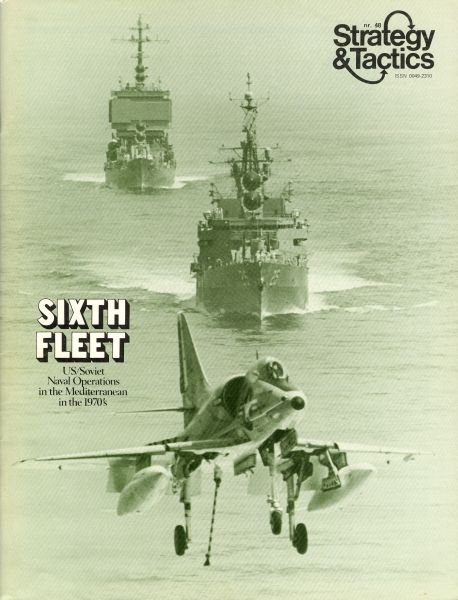Sixth Fleet: US/Soviet Naval Operations in the Mediterranean in the 1970’s (1975) Board Game
Sixth Fleet is a wargame simulation that focuses on the naval operations between the United States and the Soviet Union in the Mediterranean Sea during the 1970s. This period was marked by heightened tensions between the two superpowers, and the game captures the strategic maneuvers and confrontations that could have potentially escalated into a larger conflict.
Game Components of Sixth Fleet: US/Soviet Naval Operations in the Mediterranean in the 1970’s
How To Setup Sixth Fleet: US/Soviet Naval Operations in the Mediterranean in the 1970’s
To set up the game, players must first choose a scenario, which determines the initial deployment of forces. Each scenario outlines the specific units and starting positions for both the Soviet and NATO players. Players then place their units on the board according to the scenario instructions. The game board is divided into hexes, with each hex representing 45.4 nautical miles and each turn representing 8 hours of real time.
Gameplay Mechanics and Game Objective
Player Experience
**Sixth Fleet** offers a complex and strategic gameplay experience that requires careful planning and forethought. The game’s unique mechanics, such as the combat-then-movement rule and the retreat mechanism, make it challenging and tactically rich. However, some critics have noted that the game feels abstract and more reminiscent of land battles than naval warfare.
Pros
Cons
Personal Thoughts on Sixth Fleet: US/Soviet Naval Operations in the Mediterranean in the 1970’s
**Sixth Fleet** is a game designed for experienced wargamers who appreciate complex, strategic gameplay. While it may not be the best representation of modern naval warfare, it offers a unique and challenging experience that requires careful planning and tactical maneuvering. It is ideal for those who enjoy deep strategic thinking and are willing to invest time in learning its intricate rules. However, it may not be the best fit for casual gamers or those new to wargaming.
We are supported by our audience. When you purchase through links on our site, we may earn an affiliate commission, at no extra cost for you. Learn more.

